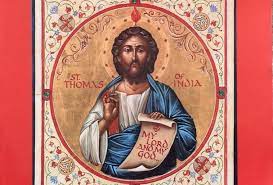Today’s readings grab our attention: the first, by Isaiah’s colourful imagery (Is 66: 10-14); the second, by St Paul’s passionate testimony (Gal 6: 14-18); and, of course, the third by Jesus’s stirring voice (Lk 10: 1-12, 17-20). Close on the heels of last Sunday’s Gospel passage, which invited us to be resolute in disseminating God’s Word, Our Lord brings into sharp focus the mission of His disciples – which is our mission too!

Coincidentally, in India, 3 July is the Solemnity of St Thomas, the Apostle. The readings proper to the occasion are from Acts 10: 24-35; Heb 1: 2-3 or Pet 1: 3-9; and Jn 20: 24-29, whose last sentence from the mouth of Jesus is ‘Blessed are those who have not seen, and yet believe’. However, we are going to comment on the readings proper to the universal Church; by God’s grace, they also fit like a glove, dwelling as they do on the life of a missionary, which St Thomas was one par excellence.
A fragment of today’s Gospel reading rings in the ear of every believer: ‘The harvest is plentiful, but the labourers few.’ How many did Jesus commission? Some codices say seventy, others seventy-two: both figures are right, as they represent the pagan communities (70 in the Hebrew text, 72 in the Greek) mentioned in Genesis 10.
St Luke is the only Evangelist who makes a mention of this number, suggesting that Jesus would not limit Himself to the twelve tribes of Israel (denoted by the Apostles) but would reach out to all communities and nations. One of them, St Thomas, travelled to South India and died there. And as members of the Church today, it is our responsibility, until the end of the world, to evangelise like them, without fear or favour.
It is noteworthy that Jesus spoke to the seventy-two after He had spoken to the Twelve (see Lk 9). Thus, the Gospel was proclaimed first in Israel and thence to others. Jesus commanded the disciples to go ahead of Him into every town and place. That He sent them out ‘as lambs in the midst of wolves’ spoke volumes of the trials and tribulations awaiting them in a hostile world. Yet, He bid them to carry no purse, no bag, no sandals, and to salute none along the way: He expected them to trust in Him alone.
The disciples also received some practical tips from the Divine Master. They were not to waste time in elaborate greetings, so typical of Oriental cultures, but to focus on announcing the Good News without delay. The disciples were to eat, drink and accept accommodation as provided to them, for the labourer deserves his wages; but they were not to have expectations or make demands – for God would sustain them. They had to reach out to the sick – not only physically but spiritually – by giving them the hope of eternal salvation.
Jesus made an interesting distinction between what was to be the disciples’ behaviour in a household and in a town per se. Not only would their greetings differ, but their attitude as well. If an individual or his household refused the disciples, the latter’s response would be milder than when a town rejected them. In the latter case, Jesus recommended that they shake off the dust of their feet. He promised them authority over the enemy and that their names would be written in Heaven. The disciples fulfilled their mandate diligently and, no wonder, they returned with joy.
 If Our Lord’s occasionally tough language does not match that goody-goody image of Him, let’s remember Jesus was not a goody-goody; He called a spade a spade, was earnest about his Father’s holy business and brooked no nonsense. Thus, the peace His disciples carried went beyond mere greetings of good health and prosperity; it was a messianic peace. And the hard-hitting words that Jesus and His disciples uttered were but messianic lamentations, for the fate that awaits detractors is one worse than Sodom’s.
If Our Lord’s occasionally tough language does not match that goody-goody image of Him, let’s remember Jesus was not a goody-goody; He called a spade a spade, was earnest about his Father’s holy business and brooked no nonsense. Thus, the peace His disciples carried went beyond mere greetings of good health and prosperity; it was a messianic peace. And the hard-hitting words that Jesus and His disciples uttered were but messianic lamentations, for the fate that awaits detractors is one worse than Sodom’s.
Jesus expects us to adopt a like posture; we are not to trivialise God. St Paul, who witnessed similar crises in the communities he tended, concludes his letter to the Galatians, by stating that salvation lies only in the Cross of Christ: ‘I do not wish to take pride in anything except in the cross of Christ Jesus our Lord,’ he said unequivocally. This is an eye-opener for us who we must learn to guard against sacrificing the truth of the Gospel to materialistic values and goals. Let us not doubt, let us not harden our hearts when we hear the Lord’s words.
We who have had the fortune of meeting our awesomely loving God must proclaim His works. The prophet Isaiah fashioned most beautiful images to give us an idea of God’s unfathomable love: it is like that of a mother for her child; of a husband for his wife; of a bridegroom for his bride. We too must acknowledge God’s omnipresence, omniscience and omnipotence. We must strive to be true disciples of Christ, the salt of the earth and light of the world. We must not hide the light under a bushel but set it upon a lampstand so that it radiates light to all in the world.
If we announce what God has done for our souls with true missionary zeal, the world will cry out with joy and sing glory to His name!
Nice Oscar……I caught on the statement ” The harvest is plenty but the labourers are few”…..am familiar…..but I need this reminder time n again…..helps me introspect my life.
Well written….this for sharing
That’s a striking statement indeed. Yes, makes us introspect. God Bless.
This reminds me a lot of this doctrine https://www.youtube.com/watch?v=ykkFVxxGJaE&t=13s